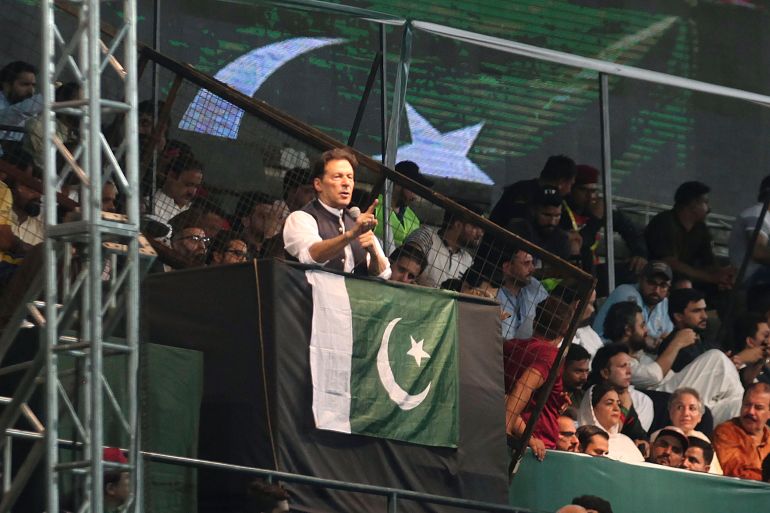Pakistan regulator bans live telecast of Imran Khan’s speeches
The former prime minister has been holding a series of rallies to protest against the arrest of his former chief of staff and alleged bias.

Pakistan’s media regulatory body has imposed a ban on live telecast of Imran Khan’s speeches with immediate effect after the former prime minister criticised police and other state institutions in a speech in the capital, Islamabad, on Saturday.
Pakistan Electronic Media Regulatory Authority (PEMRA) in a statement on Sunday accused Khan of levelling “baseless allegations” and “spreading hate speech” against “state institutions and officers”.
Keep reading
list of 3 itemsPakistan’s Imran Khan calls for early polls after Punjab victory
Protesters in Pakistan slam ‘theft’ of ex-PM Imran Khan’s mandate
Khan’s speech was in “violation of Article 19 of the constitution”, the PEMRA said in its six-page notification, ordering that only his “recorded speech” would be permitted to be broadcast, with an “effective delay mechanism” to ensure editorial control.
Addressing a large crowd in Islamabad on Saturday night, Khan had threatened to file cases against senior police officials after his close aide Shahbaz Gill was arrested on August 9.
Khan singled out senior Islamabad police officials and a female judge who had earlier in the week approved a two-day physical remand of Gill, who faces sedition charges after he was accused of inciting mutiny in the country’s powerful military.
He has accused the police of torturing Gill in custody. He maintains that the charges against his former chief of staff were a conspiracy to pit his party against the military.
“When I asked Islamabad police that ‘tell me what did you do [to Gill]’, I was told that ‘we did nothing, we got a boot from behind [to follow orders]’,” Khan said in his address.
Khan has protested against Gill’s arrest and the alleged institutional “bias” against his party, the Pakistan Tehreek-e-Insaf (PTI). It has demanded Gill’s immediate release, calling him a political prisoner.
Gill has complained of breathlessness, and a medical test conducted under custody shows he suffers from asthma. But no signs of torture were found, according to the medical report of the Pakistan Institute of Medical Sciences in Islamabad.
However, on Friday, a local court ordered another medical examination.
Federal Interior Minister Rana Sanaullah rejected the torture allegations, accusing Khan and his party of “lying”. “I can confirm as the interior minister that no torture was carried out against Gill,” said Sanaullah.
Sanaullah, from Muslim League (Nawaz) party, addressed a news conference on Sunday and accused Khan of running an “anti-state agenda”.
He said the government is exploring options to file a case against the former prime minister for his “provocative speech”.
The Islamabad police also denounced Khan’s comments and warned that anybody “threatening the police or making false accusations will be dealt with according to the law”.
The police said in a tweet it will continue to perform its duties “diligently”.
Khan has held a series of rallies across the country attended by tens of thousands of his supporters since he was overthrown as the prime minister in a vote of no confidence in April, blaming the opposition as well as the “establishment”, a euphemism for country’s powerful military.
Khan has alleged that he was removed from power as part of a “foreign conspiracy”, raising fingers of blame on the United States. Though he has not provided any proof for the allegations.
Pakistan has been ruled by the military for roughly half its 75-year history and criticism of the country’s powerful security establishment has long been seen as a red line.
Gill was arrested after he told ARY News channel that there were attempts to create hatred against the PTI among the middle and lower ranks of the military, who he said loved the party.
Gill also suggested the junior ranks were being pressured by the top brass and that these orders were against the wishes of the majority, and that the junior ranks should reconsider following orders that were against their principles.
ARY News, a private channel, was taken off air for airing “false, hateful and seditious” content by the media regulatory body PEMRA.